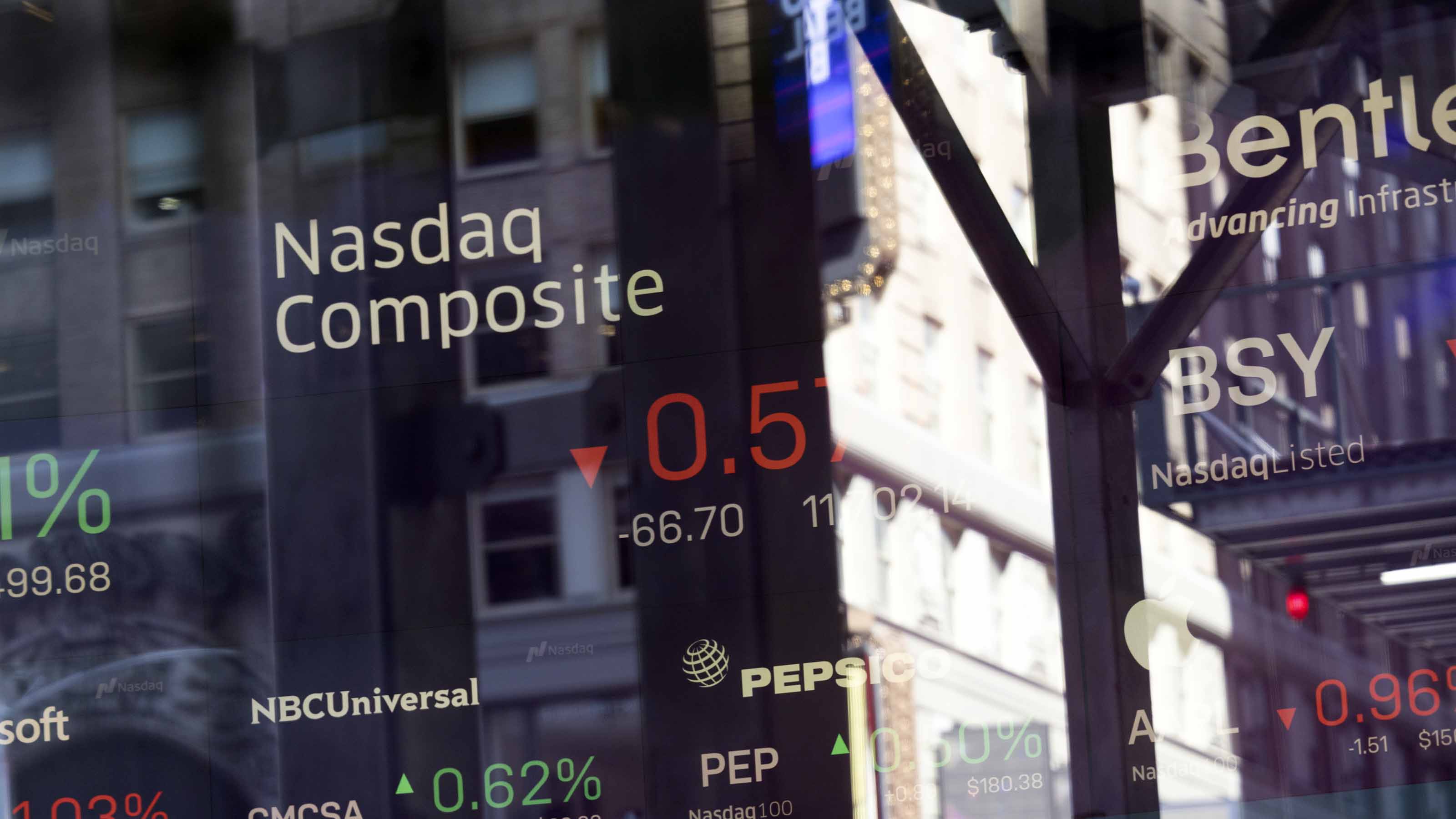What Is the Nasdaq?
The Nasdaq Composite is one of the most widely followed indexes on Wall Street, and is used to measure the performance of the stock market.


Profit and prosper with the best of Kiplinger's advice on investing, taxes, retirement, personal finance and much more. Delivered daily. Enter your email in the box and click Sign Me Up.
You are now subscribed
Your newsletter sign-up was successful
Want to add more newsletters?

Delivered daily
Kiplinger Today
Profit and prosper with the best of Kiplinger's advice on investing, taxes, retirement, personal finance and much more delivered daily. Smart money moves start here.

Sent five days a week
Kiplinger A Step Ahead
Get practical help to make better financial decisions in your everyday life, from spending to savings on top deals.

Delivered daily
Kiplinger Closing Bell
Get today's biggest financial and investing headlines delivered to your inbox every day the U.S. stock market is open.

Sent twice a week
Kiplinger Adviser Intel
Financial pros across the country share best practices and fresh tactics to preserve and grow your wealth.

Delivered weekly
Kiplinger Tax Tips
Trim your federal and state tax bills with practical tax-planning and tax-cutting strategies.

Sent twice a week
Kiplinger Retirement Tips
Your twice-a-week guide to planning and enjoying a financially secure and richly rewarding retirement

Sent bimonthly.
Kiplinger Adviser Angle
Insights for advisers, wealth managers and other financial professionals.

Sent twice a week
Kiplinger Investing Weekly
Your twice-a-week roundup of promising stocks, funds, companies and industries you should consider, ones you should avoid, and why.

Sent weekly for six weeks
Kiplinger Invest for Retirement
Your step-by-step six-part series on how to invest for retirement, from devising a successful strategy to exactly which investments to choose.
"The Nasdaq" is a term market participants hear several times a day, but what exactly is "the Nasdaq"?
Typically, when an investor says "the Nasdaq," they're referring to the Nasdaq Composite, or IXIC. This is an index that tracks the performance of the Nasdaq Stock Market, an electronic platform used to buy and sell securities. And the Nasdaq Stock Market is run by financial services firm Nasdaq (NDAQ).
There are currently more than 4,100 securities listed on the Nasdaq Stock Market, including Apple (AAPL), Microsoft (MSFT), Amazon.com (AMZN), Nvidia (NVDA), Tesla (TSLA) and Meta Platforms (META).
From just $107.88 $24.99 for Kiplinger Personal Finance
Become a smarter, better informed investor. Subscribe from just $107.88 $24.99, plus get up to 4 Special Issues

Sign up for Kiplinger’s Free Newsletters
Profit and prosper with the best of expert advice on investing, taxes, retirement, personal finance and more - straight to your e-mail.
Profit and prosper with the best of expert advice - straight to your e-mail.
While most of the investments are stocks, there are also ADRs (American depositary receipts) – which are interests in foreign companies – as well as limited partnerships, exchange-traded funds (ETFs) and tracking stocks, which represent the value of a division or subsidiary.
The Nasdaq Stock Market's market value tops $22 trillion, and over half of this comes from tech stocks. Consumer services stocks make up roughly 19%, while and healthcare comes in around 8%.
The Nasdaq Composite tracks the vast majority of the stocks listed on the Nasdaq Stock Market. It has outperformed the broader S&P 500 on an average annual return basis over the past 10 years (16% vs 13%).
Additionally, there is the Nasdaq-100 Index, also known as the NDX. This is a smaller index that tracks the performance of the 100 largest and most actively traded non-financial stocks on the Nasdaq Stock Market exchange. Its average annual return over the past decade is 19.1%.
How did the Nasdaq start?
The National Association of Securities Dealers (NASD) founded the Nasdaq Stock Market in 1971. At the time, the NASD was the self-regulatory organization for the securities industry. It would later become the Financial Industry Regulatory Authority (FINRA).
At first, the Nasdaq was a system to look up quotes for securities that traded the over-the-counter (OTC) market. This is where traders made transactions in stocks that were not listed on an official exchange.
By the 1980s, the Nasdaq was a fully functioning exchange, but to differentiate itself, it focused on smaller companies, especially those in the tech sector. Companies like Apple, Microsoft, Adobe (ADBE) and Oracle (ORCL) went public on the exchange. Biotech would also be another important category. Some of the exchange's breakout offerings were Amgen (AMGN), Biogen (BIIB) and Genentech.
The reliance on growth stocks often means higher volatility for the Nasdaq Composite. For instance, during the 1990s, the Nasdaq surged at the height of the dot-com bubble, but subsequently crashed in 2000 when it burst.
How does the Nasdaq Stock Market exchange work?
Except for stock market holidays, hours for the Nasdaq exchange are weekdays from 9:30 am to 4 pm Eastern time. However, the exchange provides for premarket trading, which starts at 4 am. There is also after-hours trading that lasts until 8 pm.
The Nasdaq Stock Market exchange is a dealers' market. This means that the exchange designates market makers to facilitate trades and provide liquidity. They have an inventory of certain securities that they can transact with customers or other dealers. A dealer will specify a bid-and-ask for their securities and the spread is the profit they make on a trade.
How are stocks listed on the Nasdaq Stock Market exchange?
Nasdaq has extensive listing requirements for initial public offerings (IPOs), spin-offs, direct listings and special purpose acquisition companies (SPACs). All of these must be in compliance with federal securities laws and state regulations. There are also thresholds for the number of shareholders, equity value and operations.
For companies that are currently listed on the Nasdaq exchange, they must maintain certain requirements and standards. If not, they could be at risk of delisting. When this happens, the stock will often start trading over the counter. This can reduce the value of the shares because of the lower liquidity and lack of analyst coverage.
Why is the Nasdaq important?
The Nasdaq Composite is important because it is one of the three most popular indexes measuring the performance of the U.S. equity market. And because it is so top-heavy in technology stocks, it is typically seen as a barometer of the health of the tech sector.
Similar to the S&P 500, the Nasdaq is market cap-weighted, meaning bigger companies make up a larger portion of the index. With its $3 trillion market cap, Apple has the biggest weighting at about 14%. Pepsico (PEP) is also in the top 10 stocks, though with a market cap of just $256.1 billion, its weighting in the Nasdaq is a much slimmer 1.2%.
Can I invest in the Nasdaq?
While investors cannot trade the Nasdaq Composite directly because it is an index, meaning it strictly measures the average price of the stocks it tracks, there are ways to gain exposure to it.
For one, investors can buy shares in the individual stocks included in the IXIC or the NDX.
Investors can easily purchase ETFs that track the index too. Some of the best ETFs to do this include the Invesco QQQ Trust (QQQ) and the Fidelity Nasdaq Composite Index ETF (ONEQ).
What about Nasdaq as a company?
Nasdaq is much more than its exchanges. The company operates a large set of other businesses. These include:
- Extensive historical and real-time data and analytics services
- Licensing for Nasdaq brands for different financial products like ETFs
- Anti-financial crime software to detect fraud and money laundering
In June, Nasdaq announced an agreement for a $10.5 billion acquisition for Adenza, a developer of risk management and trade processing software for banks and brokers. This deal highlights NDAQ's strategy to diversify the business beyond marketplaces and focus more on selling technology solutions.
Related content
Profit and prosper with the best of Kiplinger's advice on investing, taxes, retirement, personal finance and much more. Delivered daily. Enter your email in the box and click Sign Me Up.

Tom Taulli has been developing software since the 1980s when he was in high school. He sold his applications to a variety of publications. In college, he started his first company, which focused on the development of e-learning systems. He would go on to create other companies as well, including Hypermart.net that was sold to InfoSpace in 1996. Along the way, Tom has written columns for online publications such as Bloomberg, Forbes, Barron's and Kiplinger. He has also written a variety of books, including Artificial Intelligence Basics: A Non-Technical Introduction. He can be reached on Twitter at @ttaulli.
-
 Quiz: Do You Know How to Avoid the "Medigap Trap?"
Quiz: Do You Know How to Avoid the "Medigap Trap?"Quiz Test your basic knowledge of the "Medigap Trap" in our quick quiz.
-
 5 Top Tax-Efficient Mutual Funds for Smarter Investing
5 Top Tax-Efficient Mutual Funds for Smarter InvestingMutual funds are many things, but "tax-friendly" usually isn't one of them. These are the exceptions.
-
 AI Sparks Existential Crisis for Software Stocks
AI Sparks Existential Crisis for Software StocksThe Kiplinger Letter Fears that SaaS subscription software could be rendered obsolete by artificial intelligence make investors jittery.
-
 Stocks Make More Big Up and Down Moves: Stock Market Today
Stocks Make More Big Up and Down Moves: Stock Market TodayThe impact of revolutionary technology has replaced world-changing trade policy as the major variable for markets, with mixed results for sectors and stocks.
-
 Small Caps Step Up, Tech Is Still a Drag: Stock Market Today
Small Caps Step Up, Tech Is Still a Drag: Stock Market TodayEarly strength gave way to AI skepticism again as a volatile trading week ended on another mixed note.
-
 AI Unwind Takes 2% Off the Nasdaq: Stock Market Today
AI Unwind Takes 2% Off the Nasdaq: Stock Market TodayMarkets are paying more and more attention to hyperscalers' plans to spend more and more money on artificial intelligence.
-
 Strong Jobs Report Leaves Markets Flat: Stock Market Today
Strong Jobs Report Leaves Markets Flat: Stock Market TodayInvestors, traders and speculators are taking time to weigh the latest labor market data against their hopes for lower interest rates.
-
 Dow Hits New High Ahead of January Jobs Report: Stock Market Today
Dow Hits New High Ahead of January Jobs Report: Stock Market TodayA weak reading on December retail sales was in focus ahead of Wednesday's delayed labor market data.
-
 Tech Stocks Fuel Strong Start to the Week: Stock Market Today
Tech Stocks Fuel Strong Start to the Week: Stock Market TodayThe blue-chip Dow Jones Industrial Average extended its run above 50,000 on Monday and there are plenty of catalysts to keep the 30-stock index climbing.
-
 Dow Adds 1,206 Points to Top 50,000: Stock Market Today
Dow Adds 1,206 Points to Top 50,000: Stock Market TodayThe S&P 500 and Nasdaq also had strong finishes to a volatile week, with beaten-down tech stocks outperforming.
-
 Stocks Sink With Alphabet, Bitcoin: Stock Market Today
Stocks Sink With Alphabet, Bitcoin: Stock Market TodayA dismal round of jobs data did little to lift sentiment on Thursday.